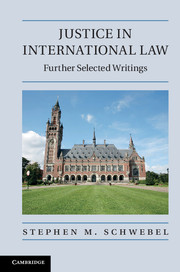Book contents
- Frontmatter
- Contents
- PART I International Court of Justice
- PART II International arbitration
- PART III Miscellaneous
- 27 May preparatory work be used to correct rather than confirm the “clear” meaning of a treaty provision?
- 28 Clean hands, principle
- 29 Compound interest in international law
- 30 The prescience and pertinence of the ILO
- 31 Is mediation of foreign investment disputes plausible?
- 32 Hersch Lauterpacht: fragments for a portrait
- 33 International Law: Being the Collected Papers of Hersch Lauterpacht
- Collected publications, judicial opinions and book reviews
- Index
33 - International Law: Being the Collected Papers of Hersch Lauterpacht
from PART III - Miscellaneous
Published online by Cambridge University Press: 07 September 2011
- Frontmatter
- Contents
- PART I International Court of Justice
- PART II International arbitration
- PART III Miscellaneous
- 27 May preparatory work be used to correct rather than confirm the “clear” meaning of a treaty provision?
- 28 Clean hands, principle
- 29 Compound interest in international law
- 30 The prescience and pertinence of the ILO
- 31 Is mediation of foreign investment disputes plausible?
- 32 Hersch Lauterpacht: fragments for a portrait
- 33 International Law: Being the Collected Papers of Hersch Lauterpacht
- Collected publications, judicial opinions and book reviews
- Index
Summary
Hersch Lauterpacht arrived at the London School of Economics in 1923 to pursue with Arnold McNair the already advanced studies in international law that he had begun in Vienna. He was then twenty-six years of age, freshly married to the wife who was to be a great support to him throughout his career. Born and raised in the part of Poland formerly under Hapsburg rule, Lauterpacht knew no one in England, had no English connections, spoke little English, and had little money. Within fourteen years, he was elected to one of the world's most distinguished professorships of international law in one of the world's most distinguished universities, as Whewell Professor of International Law at Cambridge. He went on to be elected a member of the UN International Law Commission and, in 1955, a judge of the International Court of Justice. By the time of his premature death in 1960, at the age of 62, Judge Sir Hersch Lauterpacht was widely and rightly regarded as the leading public international lawyer of his era.
Volume 5 of Lauterpacht's Collected Papers – the last of a splendid series edited by his son, Sir Elihu Lauterpacht – illustrates the range of Hersch Lauterpacht's extraordinary attainments. If he spoke little English on arrival in London, nevertheless by then he was a man of exceptional education, broadly and deeply read in several languages and disciplines.
- Type
- Chapter
- Information
- Justice in International LawFurther Selected Writings, pp. 327 - 332Publisher: Cambridge University PressPrint publication year: 2011



